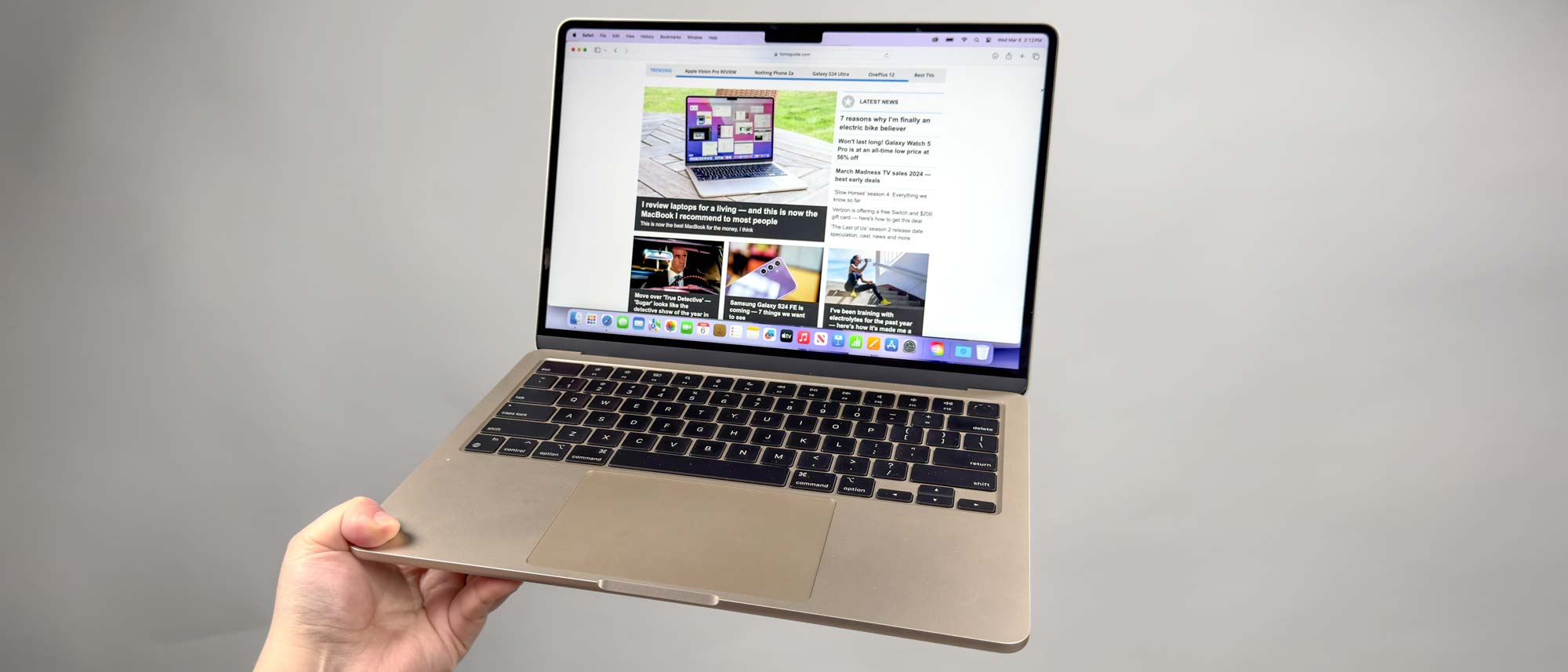Tom's Guide Verdict
The MacBook Air 13-inch M3 shares most of the same features that made its predecessor so great — a vivid 13.6-inch display, a svelte modern design and four color options. That, along with the powerful M3 chip, which delivers strong performance for work, gaming and AI tasks, makes this notebook a winner.
Pros
- +
Powerful M3 performance
- +
Bright and colorful display
- +
Ultraportable design
- +
Exceptional battery life
- +
Dual monitor support
Cons
- -
Marginally better performance over M2
Why you can trust Tom's Guide
The new MacBook Air 13-inch M3 isn't a revolution, but it offers several welcome updates over the 13-inch MacBook Air M2. The main selling point here is the inclusion of an Apple M3 chip, which brings it in line with the new crop of Pros. This processor not only features excellent CPU performance but also has graphical and AI upgrades. On top of that, the already impressive battery life has improved over its predecessor.
As with the Air M2, this updated notebook sports a bright and colorful 13.6-inch Retina display — perfect for watching videos, playing games and getting work done. It has the same flat, practical design as the most recent MacBook Pros, a comfortable keyboard, responsive touchpad and MagSafe charging. And true to its “Air” moniker, this 2.7-pound notebook is easy to carry around wherever you go.
With a starting price of $1,099, the 13-inch MacBook Air M3 isn’t exactly cheap, but it won’t break the bank compared to the pricier $1,999 MacBook Pro 14-inch or $2,499 MacBook Pro 16-inch. Even if the MacBook Air M2 now starts at $999, you’re still getting excellent value from the new Air M3 for what it offers. As things stand, it's the most affordable M3 MacBook you can buy.
Given its excellent performance, astonishing battery life and ultraportable design, the MacBook Air 13-inch M3 is one of the best MacBooks and best laptops currently available. Find out why in my full review.
- Want something bigger? See our MacBook Air 15-inch M3 review
MacBook Air 13-inch M3 review: Cheat sheet
- Who is it for? For folks who own an older M1 or Intel MacBook and want a MacBook with the latest M3 processor.
- What does it cost? The 13-inch MacBook Air M3 starts at $1,099 on Apple’s website.
- What do we like? Its eye-catching ultraportable design, vivid display, color options and strong M3 performance.
- What do we not like? Doesn’t offer a radical performance boost over the MacBook Air M2.
- Bottom line? Even if it’s more of the same, the MacBook Air M3 is an all-around excellent laptop for everyday work, gaming and video editing. This is a great notebook for first-time MacBook owners or those who want to upgrade from the MacBook Air M1.
MacBook Air 13-inch M3 review: Specs
| Row 0 - Cell 0 | MacBook Air 13-inch M3 (starting) |
| Price | $1,099 |
| Colors | Midnight, Starlight, Space Gray, Silver |
| CPU | 8-core CPU |
| GPU | 8-core GPU |
| Display | 13.6 inches (2,560 x 1,664) |
| Memory | 8GB |
| Storage | 256GB |
| Ports | 2x Thunderbolt / USB-4, 1x headphone jack |
| Webcam | 1080p |
| Charging | 30W USB-C |
| Battery life | 15 hours 13 mins (tested) |
| Size | 11.97 x 8.46 x 0.44 inches |
| Weight | 2.7 pounds |
MacBook Air 13-inch M3 review: Price and availability
The MacBook Air 13-inch M3 is now available from Apple's website starting at $1,099. This configuration features an Apple M3 chip with an 8-core CPU and 8-core GPU, 8GB of unified memory (RAM) and 256GB of SSD storage. All configurations have four color choices: Midnight, Starlight, Space Gray, and Silver.
Upgrade options include a 10-core GPU ($100), 16GB ($200) or 24GB ($400) of memory, and 512GB ($200), 1TB ($400) or 2TB ($800) of storage. The Air M3 comes with a 30W USB-C power adapter but you can upgrade to a 35W adapter or 70W adapter for an extra $20.
MacBook Air 13-inch M3 review: Design and ports
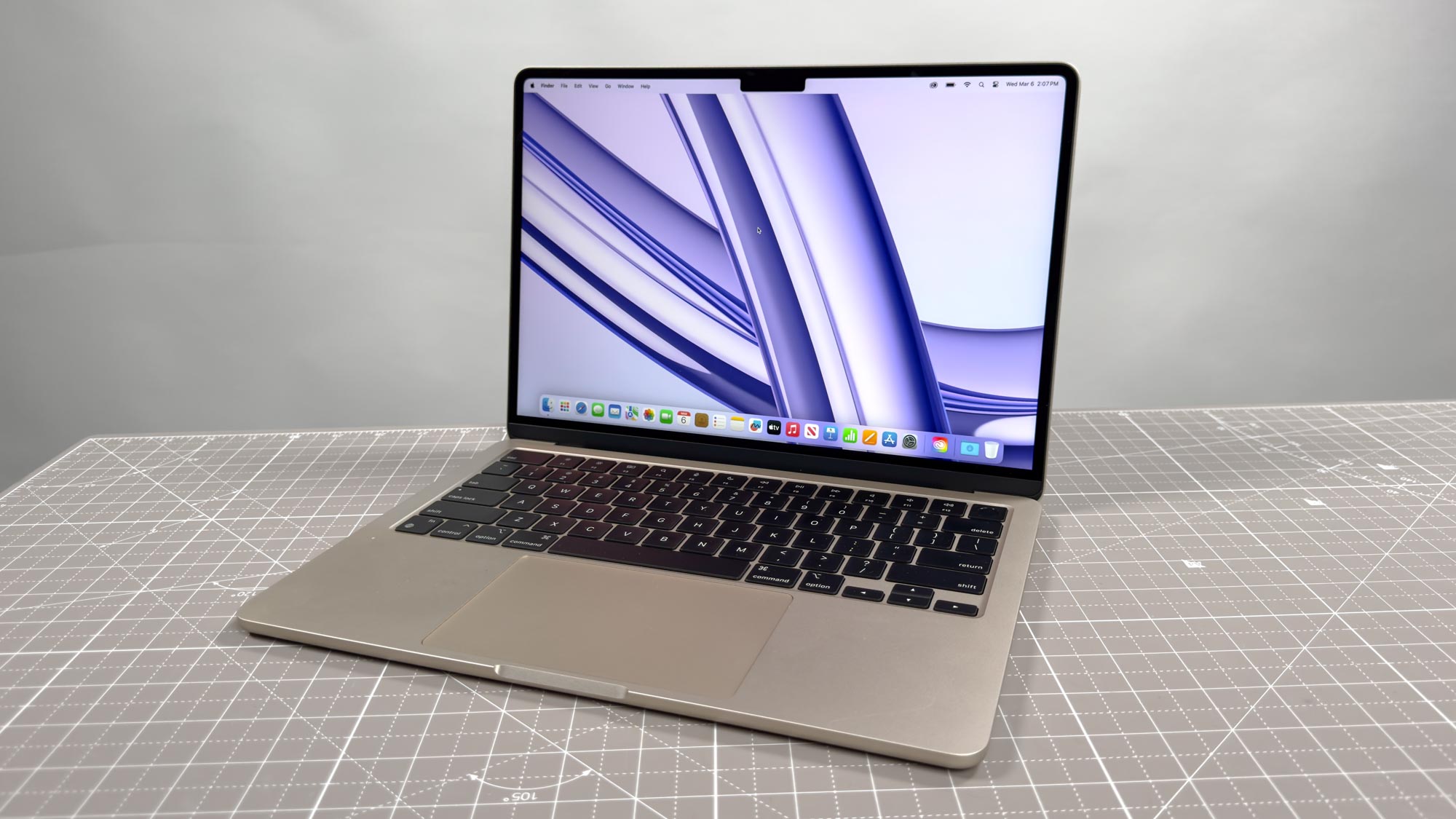
For the dawn of M3, the MacBook Air 13-inch design remains identical to its previous iteration, which is a plus since I’m a fan of the flat, utilitarian aesthetic. As before, the Air M3 is so thin that you could almost mistake it for one of the best iPads at a glance. Its small size and light weight make it the perfect travel partner. You might even forget you’re carrying it in your bag!
Get instant access to breaking news, the hottest reviews, great deals and helpful tips.
The sturdy unibody aluminum chassis not only looks great but feels good to hold. As before, it’s easy to open the lid and hold the laptop with one hand — gliding smoothly and effortlessly on that hinge. Even if you’re walking with the laptop open, the lid won’t wobble.
There are four available colors: Starlight, Silver, Space Gray and Midnight. The latter is the most interesting since it utilizes the same fingerprint-resistant technology introduced in last year's Space Black color on the MacBook Pros. Midnight is my personal favorite but all the colors look great.
Port selection is as thin as the laptop. We get a pair of Thunderbolt 4/USB-C ports on the left side, and a headphone jack on the right. There’s also a MagSafe charging port, though you can use the USB-C ports to charge the laptop if you want.
The Air M3 simultaneously supports full native resolution on the built-in display at 1 billion colors and one external display with up to 6K resolution at 60Hz and up to 5K resolution at 60Hz with the lid closed. Dual monitor support is something we wanted with the last model so it’s great to see the new laptop have this feature. However, if you like keeping your laptop open when it's connected to external displays (if you want to use its keyboard and trackpad), you'll be disappointed.
MacBook Air 13-inch M3 review: Display and audio
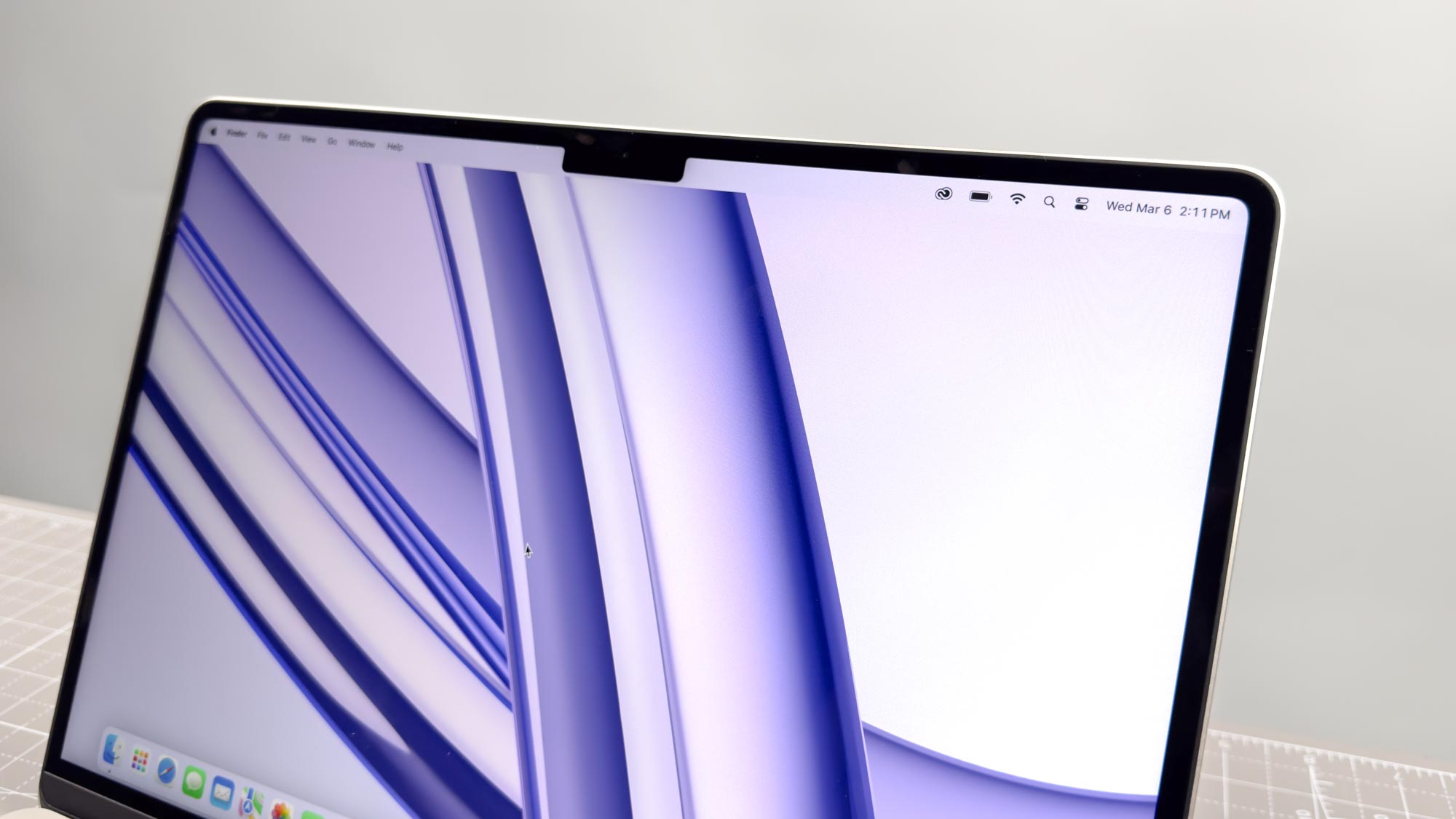
The MacBook Air 13-inch M3’s 13.6-inch display hasn’t changed from the M2 model, which suits me just fine because we’re treated to bright and colorful images no matter what we’re looking at.
The pink energy emanating from Godzilla’s dorsal plates in the latest Godzilla X Kong: The New Empire trailer looked positively radiant on the Air M3’s display. And despite the 13.6-inch display’s size, I was able to make out a lot of fine detail — even when there was a lot of action happening. Lies of P, with its moody Victorian era-inspired settings also looked phenomenal on the MacBook Air’s display.
| Header Cell - Column 0 | MacBook Air M3 (13-inch) | MacBook Air M2 (13-inch) | Dell XPS 14 (2024) |
|---|---|---|---|
| Nits (brightness) | 476 | 473 | 380 |
| sRGB | 109.8% | 110.9% | 113.2% |
| DCI-P3 | 77.8% | 78.6% | 80.2% |
| Delta-E | 0.2 | 0.2 | 0.3 |
As you can see from our test results above, there’s little difference in the new laptop’s sRGB, DCI-P3 and Delta-E values compared to the last model. SDR and HDR brightness are also similar, almost hitting the advertised 500 nits. All of this makes for a pleasant viewing experience.
One point of contention could be the notch above the display. I don’t mind it, but on a smaller screen, it appears more pronounced than on the bigger 15-inch Air and MacBook Pro 16-inch. This is purely subjective, but if you hated the notch before you won't be a fan now.
MacBook Air 13-inch M3 review: Performance
I tested last year’s MacBook Pro 14-inch M3, which has a similar M3 chip to the new MacBook Air laptops. Because of that, we saw no appreciable difference performance-wise. During testing, I had well over 30 open windows and a YouTube video playing in the background. The Air M3 handled that without breaking a sweat.
| Header Cell - Column 0 | MacBook Air 13-inch M3 | MacBook Air 15-inch M2 | Dell XPS 14 (2024) |
|---|---|---|---|
| Geekbench 6 (single-core) | 3,082 | 2,613 | 2,398 |
| Geekbench 6 (multi-core) | 12,087 | 9,993 | 12,939 |
| Handbrake | 7:19 | 7:46 | 6:20 |
| Photoshop | 8,583 / 12.4 mins | 7,465 / 13.9 mins | 6,045 / 21.6 mins |
| Premiere Pro | 3,621 / 7.8 mins | 3,170 / 8.7 mins | 4,918 / 7.3 mins |
The MacBook Air 13-inch M3 has improved performance across the board compared to its predecessor. It did better in Geekbench’s CPU test, compressed a 4K video faster in Handbrake, and sped ahead on Photoshop and Premiere Pro.
It also crushed the Dell XPS 14 in the latter two tests, though the Windows laptop did marginally better in Geekbench and Handbrake.
MacBook Air 13-inch M3 review: AI
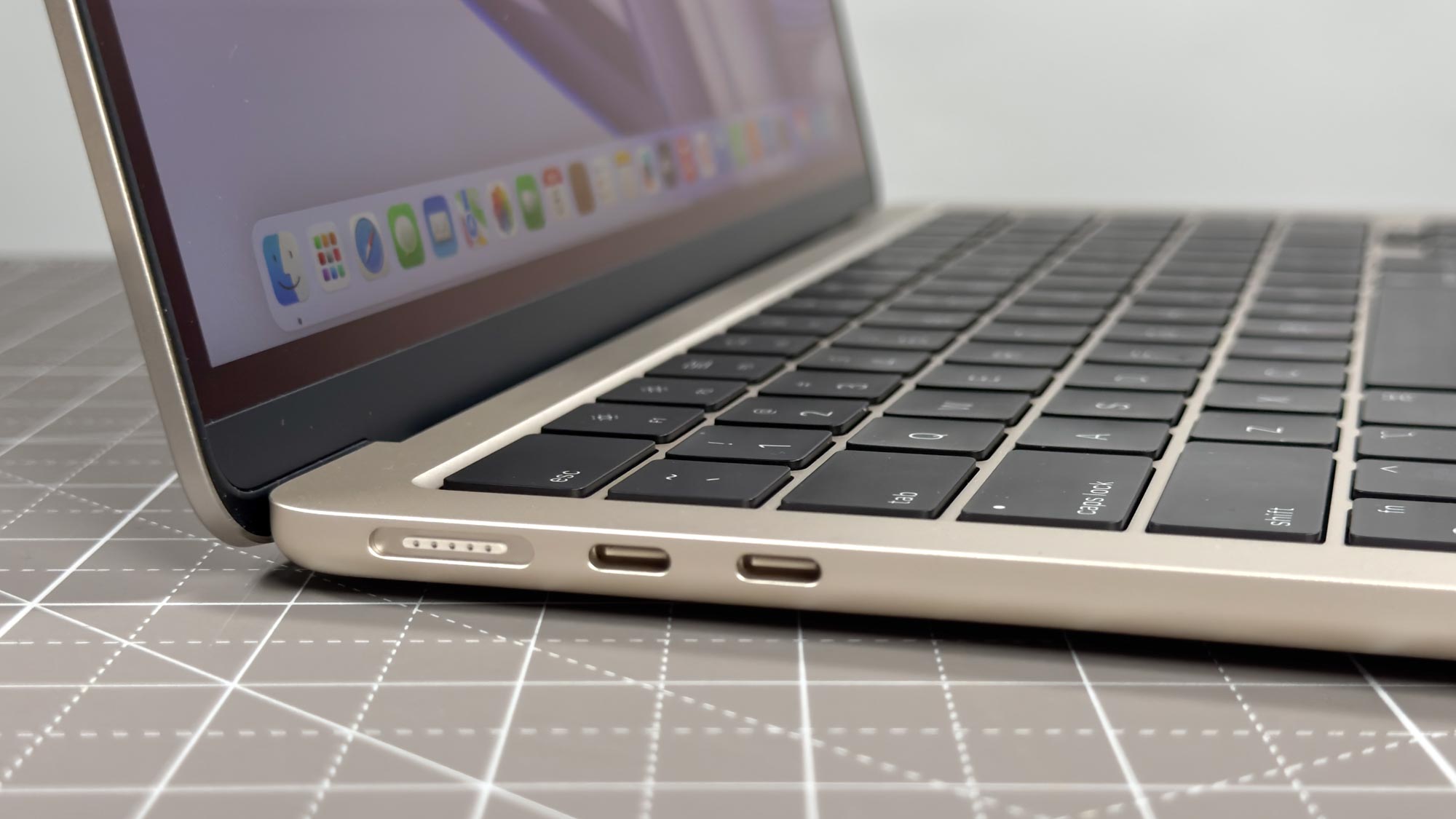
Both the 13- and 15-inch MacBook Air M3 laptops have a 16-core Neural Engine designed for AI-driven tasks. “AI laptops” are all the rage nowadays but it’s important to remember that Apple silicon has featured machine learning since 2020. The only difference now is Apple has embraced the term “AI.”
As with the AI-focused Intel Core Ultra chips, the M3 chip’s Neural Engine can remove background noise in programs like CapCut or automatically enhance photos in Pixelmator Pro. It performs these tasks on-device instead of through the cloud.
On DiffusionBee, which leverages Stable Diffision, we used the prompt: “a golden retriever jumping up to catch a tennis ball on the beach with crashing waves in the background” to see how long it would take the app to create this image.
For the 15-inch MacBook Air M3, it took 28.5 seconds to generate the prompt. That’s not too shabby, especially compared to the 37 seconds it took the Air M2. Using an app called Easy Diffusion on the XPS 14, this prompt took 14.9 seconds to generate. This last example isn’t a one-to-one comparison since we had to use different apps (there is no DiffusionBee for Windows), but this is interesting nonetheless.
For text-based responses, we used FreeChat and typed the prompt: “Give me a 500-word explanation of why the sky is blue.” This took 1 minute and 2 seconds compared to the 1 minute and 11 seconds on the Air M2. The latter needed nearly 10 seconds to respond.
It’s still early days for on-device AI computing, so it’s difficult to say if any of these features will be worthwhile to people. As with the Dell XPS 14 and Acer Swift Go 14 we’ve tested, we’ve yet to be truly impressed by “AI laptops.” But we might be singing a different tune in the future. Regardless, Apple at least has the hardware in place to take advantage of AI computing should it ever take off.
MacBook Air 13-inch M3 review: Gaming
Thanks to the M3's improved GPU, the new MacBook Air supports hardware-accelerated mesh shading and ray tracing, which offers more accurate lighting, reflections, and shadows in video games. Dynamic Caching allocates the use of local memory in hardware in real time and only uses the exact amount of memory needed for specific tasks. All of this makes games look and run better on MacBooks with M3.
While gaming performance is better on the M3 Max-powered 16-inch MacBook Pro I reviewed, the M3’s gaming performance is impressive on titles optimized for Apple silicon. Lies of P has an option to enable/disable MetalFX, which is Apple’s answer to Nvidia and AMD’s upscaling technologies. With MetalFX set on “Highest Performance,” Lies of P ran at a consistent 60 frames per second (fps) at 1200p resolution. Frame rates fluctuated between 45 to 50 fps with MetalFX disabled, which isn’t great but not horrible either.
| Header Cell - Column 0 | Frames per second |
|---|---|
| Shadow of the Tomb Raider | 25 |
| Total War: Warhammer III | 15 |
| Sid Meier's Civilization VI | 34 |
Games optimized for Apple silicon run wonderfully, but the same isn't true for non-optimized games. We ran benchmarks on titles like Shadow of the Tomb Raider, Total War: Warhammer III and Sid Meier's Civilization VI. The latter had the best results, but still below the desired 60 frames per second. The former two were virtually unplayable, with fps not even hitting 30.
MacBook Air 13-inch M3 review: Battery life
Apple boasted that the MacBook Air M3 laptops can last up to 18 hours. While the Air M3 doesn’t hit that lofty number, battery life is still quite astonishing.
| Header Cell - Column 0 | Time (hours:mins) |
|---|---|
| MacBook Air 13-inch M3 | 15:13 |
| MacBook Air 13-inch M2 | 14:33 |
| Acer Swift Go 14 | 9:50 |
| Dell XPS 14 | 6:26 |
On the Tom’s Guide battery test, which involves continuous web surfing at 150 nits of screen brightness, the MacBook Air 13-inch M3 lasted for an incredible 15 hours and 13 minutes. That’s forty minutes longer than the Air M2, which lasted for 14 hours and 33 minutes.
Endurance-wise, Windows laptops like the Acer Swift Go 14 (9:50) and Dell XPS 14 (6:26) aren’t even in the same league as Apple’s notebooks. M-series machines maintain their battery life supremacy. It’s not even a contest at this point.
MacBook Air 13-inch M3 review: Keyboard and touchpad
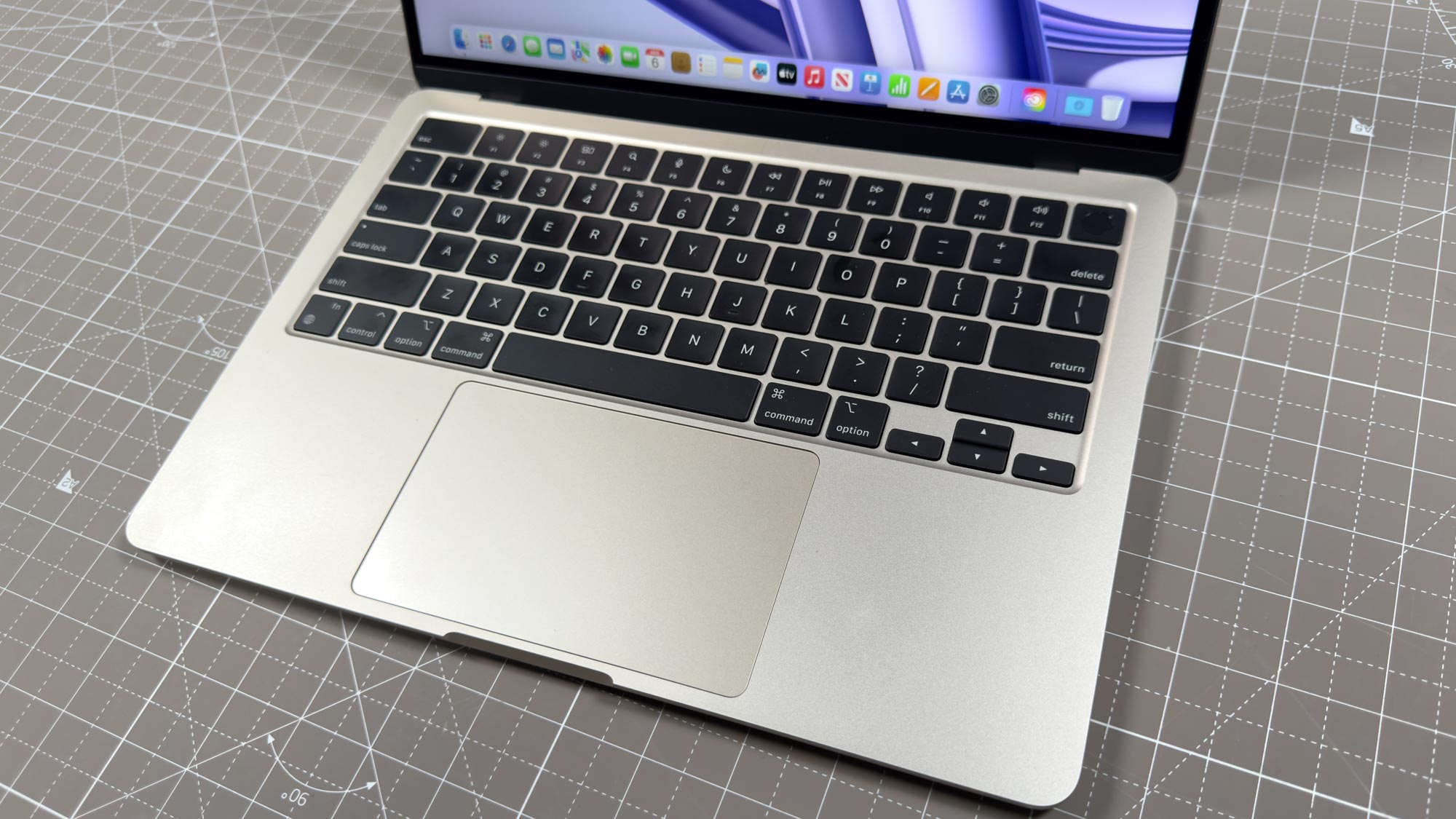
The 13-inch MacBook Air M3’s keyboard is a joy to type on thanks to its thick keycaps and nice travel distance. While the keyboard deck doesn’t give my big hands much room to move, my fingers never became cramped. Typing never became uncomfortable even after hours of typing.
I also liked the smooth and responsive touchpad, which never failed to register my swipes and clicks. The touchpad is pretty large but I never accidentally swiped it despite the small keyboard deck. I’d still rather use one of the best wireless mice with this (or any) laptop, but the touchpad gets the job done.
MacBook Air 13-inch M3 review: Verdict
The MacBook Pro 13-inch M3 impresses thanks to its tasteful ultraportable design, bold display, epic battery life and powerful M3 performance.
While MacBook Air M2 owners don't have to upgrade due to the relatively small bump in performance, MacBook Air M1 users should seriously consider buying the new laptop. The same is true for anyone new to the Apple ecosystem seeking the most recent Air model.
Even if $1,099 isn't cheap, the new 13-inch MacBook Air is the most affordable Apple laptop packing an M3 chip. For what it offers, it's a magnificent value.

Tony is a computing writer at Tom’s Guide covering laptops, tablets, Windows, and iOS. During his off-hours, Tony enjoys reading comic books, playing video games, reading speculative fiction novels, and spending too much time on X/Twitter. His non-nerdy pursuits involve attending Hard Rock/Heavy Metal concerts and going to NYC bars with friends and colleagues. His work has appeared in publications such as Laptop Mag, PC Mag, and various independent gaming sites.
